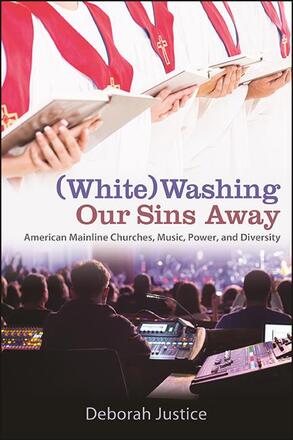
(White)Washing Our Sins Away
American Mainline Churches, Music, Power, and Diversity
Alternative formats available from:
Analyzes how White American mainline Protestants used the internal musical controversies of the turn-of-the-millennium Worship Wars to negotiate their shifting position within the nation's diversifying religious and sociopolitical ecosystems.
Description
What if simply changing musical styles could resurrect social power and religious vitality? By the early 1990s, Christianity was losing ground nationally, and mainline Protestants were trending even Whiter and older than America's overall demographic trajectory. The churches knew they needed to diversify. Yet, many mainline churches focused their energies on the so-called Worship Wars, intense aesthetic and theological controversies running through much of White Christian America. Historically, churches had only supported one musical style; now, many mainline Protestant congregations were willing to risk internal schism to support both Contemporary worship—centered around guitars, praise bands, and choruses—and Traditional worship with its pipe organs, chancel choirs, and hymns. Surely, they thought, musical diversity would broadcast tolerance and bring in new members—perhaps it would even help them regain their historically central role in American society. Based on years of ethnographic research, (White)Washing Our Sins Away explores how American mainline Protestants used internal musical controversies to negotiate their shifting position within the nation's diversifying religious and sociopolitical ecosystems.
Deborah Justice teaches at the Setnor School of Music at Syracuse University and is Managing Director of the Cornell Concert Series at Cornell University. She is the author of Middle Eastern Music for Hammered Dulcimer.
Reviews
"(White)Washing Our Sins Away is an ambitious and complex work. The fieldwork involved was intense and joyful and lengthy. The author takes great care in giving the subjects a platform to speak. The book addresses scholarship primarily in the areas of whiteness studies and works on contemporary Protestantism, especially Protestant church music. It is an ethnographic work situated contextually within the societal swirl of the Worship Wars. It illustrates how musical style serves as the chief currency for a dramatic denominational transformation." — Journal of Folklore Research Reviews
"Ultimately, (White)Washing Our Sins Away offers an excellent account of musical identity formation and its significance for spiritual experience. Its detailed parsing of the ways in which musical practice had unexpected consequences for congregational identity demonstrates how important music is to the study of religion. It pinpoints the tensions within mainline Protestantism's identity in an era of numeric decline. The book is honest in its grappling with the way in which racist legacies continue to inform the communities, both religious and academic, to which Justice is committed. This honesty lays the groundwork for further critical engagement with both ethnography and mainline Protestantism." — Reading Religion
"Accessible to undergrad and graduate students, as well as scholarly audiences in a variety of fields: American studies, cultural anthropology, ethnomusicology, and religious studies, among others. It would be an obvious choice for a 'Music and Religion' course." — Andrew Mall, author of God Rock, Inc.: The Business of Niche Music
"Offers a strong ethnography of a Protestant congregation grappling, via music, with issues of identity and values that are in the fore of cultural shifts that have been developing since the mid-twentieth century." — Tom Wagner, author of Music, Branding and Consumer Culture in Church: Hillsong in Focus